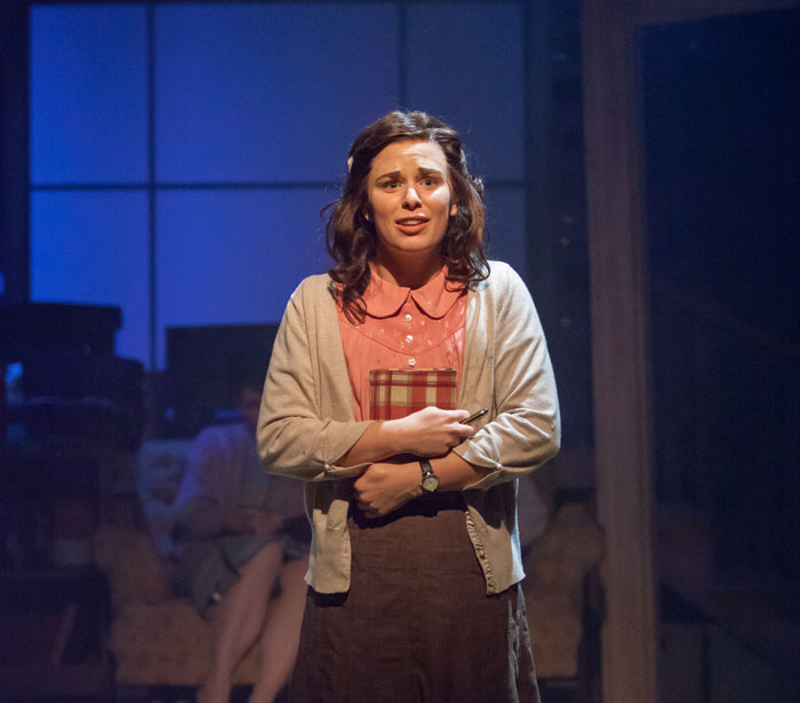
For a Hanukkah celebration, Anne improvised simple gifts for everyone, including earplugs for Mr. Dussel, a Jewish dentist added to their hideout who shared her bedroom. She playfully told him she hoped they would enable him to sleep while she wrote with a scratchy fountain pen.
More than 80 years later, we are lucky that her words were not silenced, but rather survived in her diary, first published in 1947 as The Diary of a Young Girl.
Her story has had cinematic and theatrical iterations. A play by Frances Goodrich and Albert Hackett, now adapted by Wendy Kesselman, is a powerfully moving season opener for Cincinnati Shakespeare Company. The production has been staged by Jeremy Dubin, artistic associate, and features company member Courtney Lucien in a convincing performance of the title role.
The story of Anne, her parents Otto (Barry Mulholland) and Edith (Regina Pugh), her older sister Margot (Caitlin McWethy), as well as the Van Daans (Kelly Mengelkoch and Jim Hopkins), their son Peter (Kyle Brumley) and nervous Mr. Dussel (Billy Chace), has moments of humor, to be sure. But the oppressively close living circumstances tried the patience of all.
They seldom had enough food, and personality differences led to numerous arguments. But close proximity also fostered a budding romance between Anne and Peter, and a closer relationship between Anne and her stern mother. Lucien convincingly conveys a full spectrum of adolescent emotions, from ebullient joy at a few movie star magazines to nights plagued by horrific, fearful nightmares.
As Anne’s rational and caring father, Mulholland is the consistent peacemaker, often required to be braver than he ever imagined would be needed for the sake of his family. His sadness at being the family’s sole survivor is palpable as the play concludes.
McWethy’s Margot speaks less than the others — she is an introverted, serious-minded young woman whose caring relationship with Anne is another reflection of her character’s strength.
Pugh is Anne’s fearful and no-nonsense mother, impatient with Mrs. Van Daan and her privileged, flirtatious ways. Mengelkoch plays the other mother, potentially an object of scorn, with sensitivity, and we feel her pain when she is forced to give up her treasured fur coat to pay for food. Hopkins’ portrait of Mr. Van Daan, a hulking man with profound appetites for food and cigarettes, is a counterpoint to the self-sacrificing Otto Frank.
Brumley’s performance shows Peter’s evolution from a scornful fellow refugee to an ardent boyfriend, won over by Anne’s disarming manner. He eventually revels in confiding with her.
But it’s really on Lucien’s shoulders to carry the story of this sensitive, brave young woman, forced by the horrors of war and intolerance to explore her innermost emotions and thoughts at an age when most teenagers are consumed with immature issues.
Lucien never caricatures Anne’s impetuous ways — she seriously announces that she wants to be “remarkable” — but in the moments when we hear Anne’s words in recorded voiceovers, or when Lucien is delivering them from a pool of light on a darkened stage, we see the real loss to the world of this insightful and promising voice, silenced by senseless oppression. “Will this ever be over?” she implores.
As the play’s first act ends, a bit of visible sky inspires her. She yearns to see it “open wide” and prays for the freedom to experience the broader world in which she might express herself.
Anne’s writing buoys her up and sustains her despite the parameters of her restrictive confinement, even though she can have little confidence regarding what the not-too-distant future holds. With only a slight premonition of horrors that lay ahead, Lucien’s Anne exclaims why she writes: “I want to go on living — even after my death.”
That’s precisely what Anne Frank’s life has done. Her words, brought to life visually and vividly in the final moment of Cincinnati Shakespeare’s fine production, bear witness to Anne’s promise, her tragedy and what her too-short life continues to deliver to a troubled world.
THE DIARY OF ANNE FRANK, presented by Cincinnati Shakespeare Company, continues through Oct. 1. More info: cincyshakes.com.






